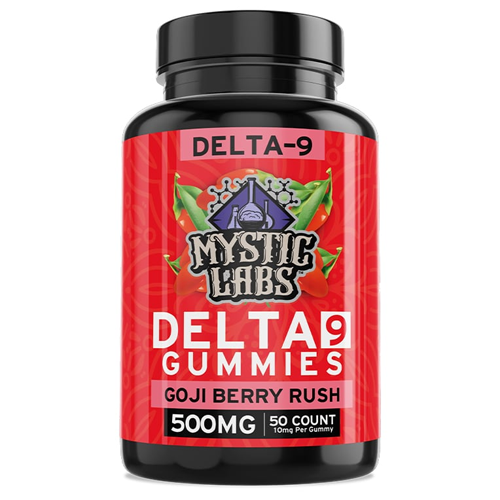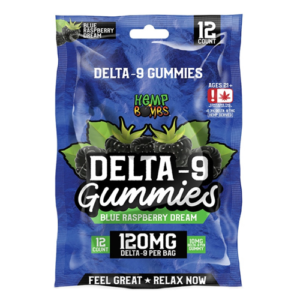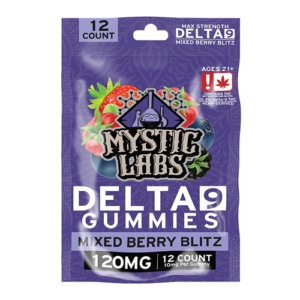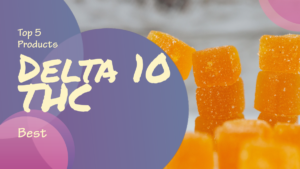Delta 9 THC, known as delta-9-tetrahydrocannabinol, is a prominent chemical in cannabis and hemp plants, recognized for its psychoactive properties once converted from its original state, THC-a, through heat in a process called decarboxylation. Its presence defines the distinctive high associated with traditional weed, setting the stage for a detailed examination and comparison in the debate of delta 9 vs weed, exploring not just the high but also the medical applications and legal status of these substances. This comparison delves beyond the surface to unravel the complexities between delta 9 THC, often featured in discussions around medical marijuana, delta 8 vs delta 9, and hemp-derived products, offering insights into their chemical structures, effects, and the evolving landscape of cannabis regulation.
In navigating through the nuances of delta 9 vs weed, the article will present a comparative analysis focused on the legalities, effects, and medical efficacy of delta 9 THC, including how it compares with other cannabinoids like delta 8 and delta 10. Highlighting the significance of hemp-derived delta 9 in the conversation allows for a broader understanding of its role within the cannabis spectrum and its impact on users and the medical community alike. This exploration aims to provide clarity and dispel myths, ensuring readers are informed about what delta 9 THC is and its place within the wider context of cannabis use and legislation.
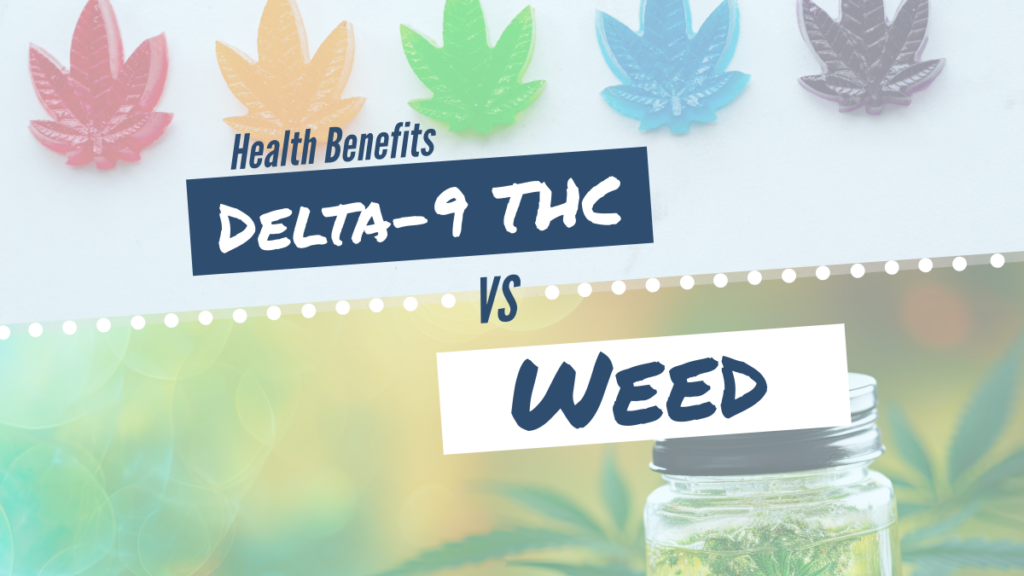
Delta-9 THC vs Weed
- Delta-9 THC vs. Weed Cannabinoid Content:
- Both Delta-9 THC and Weed contain cannabinoids, with Delta-9 THC being the primary psychoactive component responsible for the ‘high’ sensation in Weed.
- Weed, or cannabis, includes a variety of cannabinoids such as CBD and CBG, in addition to Delta-9 THC.
- Forms and Variants:
- Delta-9 THC is available in multiple forms including edibles, oils, tinctures, and vapes, allowing for diverse methods of consumption.
- Hemp-derived Delta-9 THC involves processing hemp CBD oil to derive concentrations of Delta-9, presenting a legal alternative under current regulations.
- Psychoactive Effects and Legality:
- The effects of Delta-9 THC can range from euphoria and relaxation to altered perception of time and increased appetite. These effects are not uniform and can vary based on individual factors like tolerance and body chemistry.
- Legally, Delta-9 THC remains a Schedule I controlled substance at the federal level in the United States, though some states have legalized its use for medical and recreational purposes.
This section highlights the distinctions and similarities between Delta-9 THC and Weed, emphasizing their content, forms, effects, and legal status to provide a comprehensive understanding for informed decision-making.
Delta-9 THC Buying Guide

Discover everything you need to know with the Delta-9 THC Buying Guide. Explore legality, benefits, top products, and clinical trial reviews. Make informed decisions with Racer Ephedra’s detailed insights.
Chemical Structures and Psychoactive Effects
- Chemical Structures and Psychoactive Effects:
- Delta 9 THC:
- Chemical Properties: Delta 9 THC (Δ9-THC) is a volatile, viscous oil with high lipid solubility and low aqueous solubility. It has a pKa of 10.6, indicating its acidic nature.
- Metabolism: Upon consumption, Δ9-THC undergoes hydroxylation to form 11-hydroxy ▵9-tetrahydrocannabinol (11-OH-THC), which is psychoactive. Further oxidation produces THCCOOH, an inactive metabolite used for diagnostic purposes.
- Bioavailability: After inhalation, Δ9-THC reaches peak plasma concentrations within 3-10 minutes, with bioavailability ranging from 10-27% depending on usage habits.
- Psychoactive Effects: Effects include altered senses, mood changes, impaired movement, and memory issues. The intensity can vary from mild relaxation to intense intoxication based on dosage and individual chemistry.
- Comparison with Other Cannabinoids:
- Delta 8 THC: Less psychotropic due to lower affinity for the CB1 receptor. Found in lower concentrations in cannabis and can be synthesized from other cannabinoids.
- THC-O: Approximately 3-4 times stronger than Delta-9, potentially offering psychedelic effects. It has a slower onset time compared to Delta-9, with effects from inhalation starting within 10-15 minutes.
- Diagnostic and Analytical Aspects:
- Detection: Δ9-THC is detectable in plasma seconds after inhalation with a rapid decline in concentration within hours. Diagnostic testing primarily utilizes immunoassay, but due to potential inaccuracies, positive results are confirmed via chromatographic techniques.
- Delta 9 THC:
This detailed examination of the chemical structures and psychoactive effects of Delta 9 THC, compared to its analogs, underscores the complexity of its interaction with the human body and its potent effects relative to other cannabinoids.
Legal Status and Regulation
- Federal vs. State Regulations:
- Hemp-derived Delta-9 THC is federally legal if it contains no more than 0.3% THC on a dry weight basis under the 2018 Farm Bill.
- Cannabis-derived Delta-9 THC over 0.3% remains federally illegal, but individual states may have different laws allowing its use either medically or recreationally.
- Delta-8 THC, while less potent, faces varied legal statuses; it’s legal in some states but completely banned in others like Alaska and Colorado.
- Regulatory Challenges and Consumer Safety:
- The FDA has not approved Delta-8 or Delta-9 for safe use, raising concerns about their safety and the accuracy of labeling on these products.
- Companies must ensure their hemp-derived products do not exceed the 0.3% THC threshold, undergo safety testing, and prevent sales to minors.
- Critics argue that selling intoxicating products outside of regulated dispensaries could lead to easier access for minors and products that don’t meet safety standards.
- Legislation and Industry Impact:
- Legislative Efforts: Rep. Chellie Pingree introduced a bill aiming to tighten regulations on hemp-derived products to ensure safety and proper marketing.
- Industry Response: Some brands exploit legal loopholes to sell Delta-9 products in non-dispensary settings, which could potentially lead to broader market opportunities but also increased scrutiny and calls for regulation.
- State Actions: Several states have enacted laws to limit or regulate the sale of Delta-8 due to its psychoactive effects, even though it’s less potent than Delta-9.
Medical Applications and Efficacy
Medical Applications and Efficacy
Delta-9 THC and Weed:
- Pain Management: Both Delta-9 THC and weed are renowned for their effectiveness in pain relief, particularly chronic pain, which is a common condition for medical cannabis use in states like Colorado and Oregon.
- Nausea and Appetite Stimulation: These substances are pivotal in managing nausea and vomiting, especially for chemotherapy patients, and are effective in stimulating appetite in conditions such as HIV/AIDS and cancer.
- Neurological Disorders: Multiple sclerosis-related spasticity symptoms are notably improved with short-term use of oral cannabinoids, highlighting Delta-9 THC’s role in managing severe spastic conditions.
Comparative Efficacy with Other Cannabinoids:
- Delta-8 THC vs. Delta-9 THC: Delta-8 THC offers similar medicinal benefits such as pain relief and anti-inflammatory effects but with fewer psychoactive effects, making it a preferable option for patients seeking less intensity in psychoactive experiences.
- Pharmaceutical Cannabinoids: Nabiximols, a balanced THC/CBD pharmaceutical derivative, is approved in multiple countries for treating pain and spasticity associated with multiple sclerosis, showcasing the medical community’s acceptance of cannabinoid-based therapies.
Challenges and Considerations:
- Long-term Efficacy and Safety: While effective in the short term, the long-term effects of medical marijuana, particularly concerning psychoactive and neurocognitive impacts, remain under-researched and are a significant concern in clinical settings.
- Regulatory and Approval Challenges: Despite its efficacy, Delta-9 THC has not received FDA approval for treatment of pain, sleep disorders, or autoimmune diseases, reflecting the need for more extensive clinical trials and evidence of safety.
- Specificity in Application: Medical use of cannabinoids shows promise in specific conditions like refractory neuropathic pain; however, generalizing its use across all chronic non-cancer pain conditions is not supported by current evidence, necessitating cautious prescription practices.
This analysis underscores the therapeutic potential of Delta-9 THC and related cannabinoids while also highlighting the need for careful consideration of their psychoactive effects and the regulatory landscape that governs their use.
Usage and Consumption Methods
Usage and Consumption Methods
Delta 9 THC and weed offer a variety of consumption methods, each with its own set of characteristics regarding onset, duration, and intensity of effects. Here’s a breakdown of the primary methods:
- Inhalation (Smoking and Vaping):
- Smoking and Vaping: These methods allow for the rapid delivery of cannabinoids into the bloodstream, providing quick onset of effects.
- Products Used: Commonly involves using dried cannabis flowers, vape pens, or pre-filled oil cartridges.
- Oral Consumption:
- Edibles: These include products such as gummies, chocolates, and beverages. Edibles have a delayed onset of effects, typically taking 30 minutes to 2 hours to manifest, but the effects can last longer compared to inhalation.
- Capsules and Tinctures: Capsules offer a dose-controlled method to consume THC, while tinctures are typically administered sublingually (under the tongue), leading to quicker absorption than edibles but slower than inhalation.
- Hemp-derived Delta-9 THC Seltzer: A novel product, this seltzer contains 10mg of Delta-9 THC per serving, complying with the legal limit of less than 0.3% THC by volume. This allows for broader availability and legal sale in various locations.
- Topical Application:
- Creams and Balms: These products are applied directly to the skin. Ideal for localized relief, topicals are typically non-psychoactive and do not provide the ‘high’ associated with other methods.
Each method of consumption has its own profile in terms of how quickly it delivers THC into the system, the duration of its effects, and the overall intensity. It is crucial for users to consider these factors, along with individual tolerance and desired outcomes, when choosing a method of consumption. Additionally, the potency of the product and the specific consumption method can significantly impact the user’s experience and potential risks.
Safety and Side Effects
Safety and Side Effects
1. Potential Health Risks and Interactions:
- Substance Interactions: THC can significantly interact with various medications, including those that slow the central nervous system, such as anesthesia, potentially complicating medical procedures. It also affects the efficacy of drugs metabolized by the liver and can enhance the effects of blood thinners like warfarin.
- Cannabinoid Hyperemesis Syndrome (CHS): Prolonged use of cannabis products, including Delta-9 THC, can lead to CHS, which causes severe, recurrent nausea and vomiting.
- Psychological Impact: There is a noted increase in the potency of cannabis globally, which correlates with heightened health concerns, particularly the risk of developing persistent psychotic disorders in a dose-related manner.
2. Side Effects of Delta 9 THC and Weed:
- Both substances can cause common side effects such as dry mouth, increased appetite, red eyes, and memory impairment. More severe effects include anxiety and altered heart rate.
- Smoking Delta 9 THC or weed may lead to respiratory issues like bronchitis and potentially chronic obstructive pulmonary disease.
3. Considerations for Safer Use:
- Age and Developmental Risks: Usage during adolescence is particularly concerning due to the potential impact on brain development.
- Exploring Alternatives: For individuals looking for less potent effects or those new to cannabis products, exploring milder options such as Delta-8 THC or CBD might be advisable.
- Responsible Use: It is crucial to approach the use of these substances with caution, considering potential dependencies and the legal implications of failing drug tests.
Where can you get Delta-9 THC
Purchasing Delta-9 THC products can be done conveniently through various online vendors, each offering a range of products tailored to different preferences and needs. Here’s a guide to some reputable sources where you can find Delta-9 THC:
- Online Retailers:
- Racer Ephedra: The retailer provides a broad selection of Delta-9 THC products, including edibles, drinks, and tinctures. They offer the convenience of free shipping on orders over $49.
- CBD: Racer Ephedra extends its offerings to include not just edibles and drinks, but also vapes, gummies, flower, tinctures, and cartridges, catering to a wide array of consumption preferences.
- Delta-9 THC: Specializes in Delta-9 THC flower, which contains 8-13mg of Delta-9 THC per serving, available at best prices online. This option is suitable for those preferring a more traditional consumption method.
- Specialized Formulations:
- Mystic Labs Delta 9 THC Gummies: Available in various flavors, these gummies contain 350 mg of total Delta 9 THC per pack, offering a potent option for those who prefer edible forms. They are priced at $17.75 per pack.
- Cannabis Life Delta-9 THC 150mg: These gummies are unique due to their 1:4 THC to CBD ratio, made with Whole Spectrum hemp extract. They are infused with a mix of cannabinoids and other natural substances, providing a comprehensive cannabinoid experience.
- Important Considerations:
- When selecting Delta-9 THC products, it is crucial to purchase from reputable companies. Look for products that have been tested by third-party labs to ensure safety and quality. This step is vital in verifying the product’s compliance with legal standards and its safety for consumption.
By exploring these options, consumers can find Delta-9 THC products that meet their specific needs and preferences, ensuring a satisfactory experience with safe and legal cannabis consumption.
Conclusion
Through the comparative analysis of Delta 9 THC and weed, this article has provided an in-depth exploration into the nuances distinguishing these substances, from their chemical composition and psychoactive effects to legal implications and medical applications. We’ve highlighted the importance of understanding the specific characteristics, usage methods, and regulatory status of Delta 9 and other cannabinoids, underscoring the necessity for informed consumption decisions and the call for further research to navigate the evolving landscape of cannabis use.
Moreover, by delving into the safety, side effects, and the broad spectrum of available products, we’ve aimed to equip readers with the knowledge required to make educated choices regarding Delta 9 THC and weed consumption. The discussion on legislation, medical efficacy, and the potential for future studies sheds light on the complex interplay between policy, health, and consumer safety, opening avenues for ongoing dialogue and discovery in the pursuit of understanding cannabis and its derivatives at a deeper level.
References
Hart, C.L., Ward, A.S., Haney, M. et al. Comparison of smoked marijuana and oral Δ9-tetrahydrocannabinol in humans. Psychopharmacology 164, 407–415 (2002). https://doi.org/10.1007/s00213-002-1231-y
Sharma P, Murthy P, Bharath MM. Chemistry, metabolism, and toxicology of cannabis: clinical implications. Iran J Psychiatry. 2012 Fall;7(4):149-56. PMID: 23408483
Atakan Z. Cannabis, a complex plant: different compounds and different effects on individuals. Therapeutic Advances in Psychopharmacology. 2012;2(6):241-254. doi:10.1177/2045125312457586
National Academies of Sciences, Engineering, and Medicine; Health and Medicine Division; Board on Population Health and Public Health Practice; Committee on the Health Effects of Marijuana: An Evidence Review and Research Agenda. The Health Effects of Cannabis and Cannabinoids: The Current State of Evidence and Recommendations for Research. Washington (DC): National Academies Press (US); 2017 Jan 12. 4, Therapeutic Effects of Cannabis and Cannabinoids. Available from: https://www.ncbi.nlm.nih.gov/books/NBK425767/
Deshpande A, Mailis-Gagnon A, Zoheiry N, Lakha SF. Efficacy and adverse effects of medical marijuana for chronic noncancer pain: Systematic review of randomized controlled trials. Can Fam Physician. 2015 Aug;61(8):e372-81. PMID: 26505059
